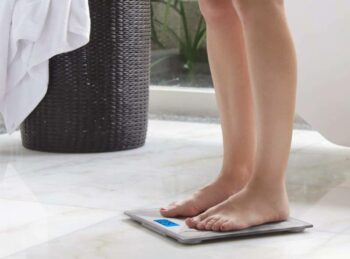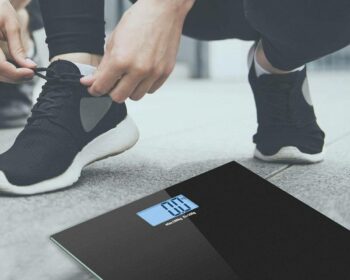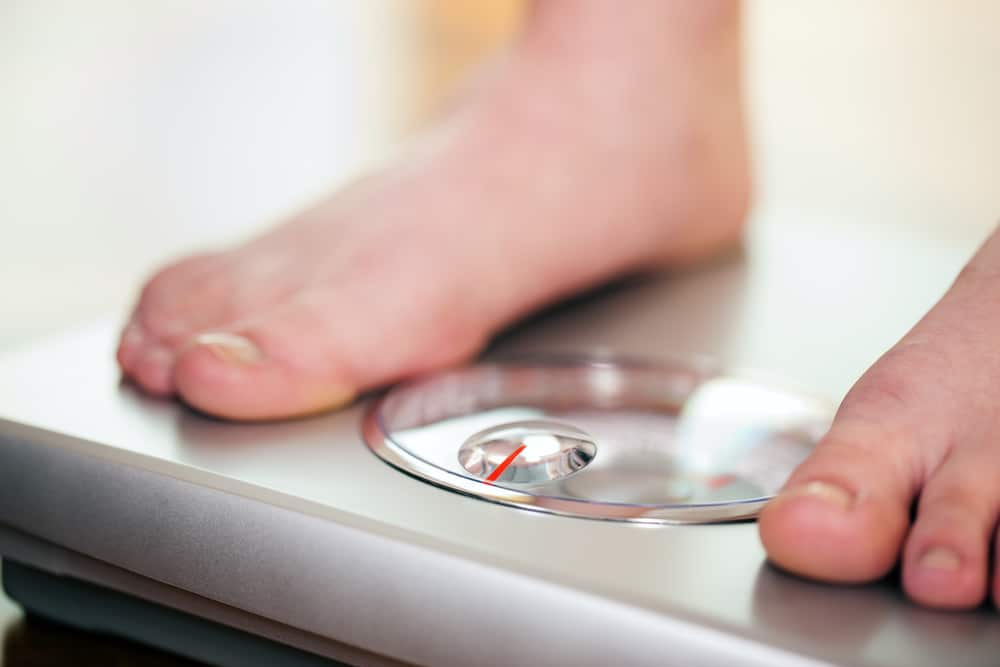Last Updated on January 10, 2023
If you want to measure your body fat and body composition to track weight loss or muscle mass, you need the best bathroom scales for the job. But you’ll also require accurate scales for weighing yourself.
In today’s article, we’re exploring how to properly use bathroom scales, the best ways to get precise data, and some factors that can cause inconsistencies – to determine how accurate are bathroom scales.
Avoid Fluctuations in Weighing
One of the best ways to keep track of your actual weight is by weighing yourself at a consistent time of day, like as soon as you wake up. This can help to minimise alterations in your body caused by hydration and eating. In fact, if you weigh yourself over several courses in one day, you might find that you’ve gained 5lbs when it’s just caused by shifts in diet and water weight. Therefore, if you’re used to weighing yourself first thing in the morning, then get into a routine and stick to it.
How Do I Know if My Bathroom Scale Is Accurate?
 If you want to accurately measure your weight, whether it’s for your weight loss journey or to know your body composition, you’ll need to put your bathroom scales to the test. Before you begin, make sure that the floor surface you’re using is flat and hard. Using your bathroom scale on the carpet and raised flooring can massively alter the scales – for both mechanical and digital scales. You should then pick up the scales and clean them to remove any debris that could get in the way of the sensors to impact the results.
If you want to accurately measure your weight, whether it’s for your weight loss journey or to know your body composition, you’ll need to put your bathroom scales to the test. Before you begin, make sure that the floor surface you’re using is flat and hard. Using your bathroom scale on the carpet and raised flooring can massively alter the scales – for both mechanical and digital scales. You should then pick up the scales and clean them to remove any debris that could get in the way of the sensors to impact the results.
There are certain environmental factors that can affect the accuracy and legitimacy of bathroom scales, such as temperature. The temperature in the room can affect the resilience of the materials used to create the scale. So if you weigh yourself when it’s cold and then when it’s hot, you might encounter different readings.
1. Check if the scales are properly set to zero.
First, make sure that the body scales are set to zero. This might sound obvious, but it’s easy to forget. Even a digital scale requires zeroing out, which might involve stepping on and off of the digital bathroom scales, or perhaps you’ll need to press a reset function. Check out the instructions that came with the scales on how to properly reset them.
If you own mechanical bathroom scales, you might need to turn a dial to ensure that the scale is tared to zero before you step onto it and take your weight. If you have digital scales, it might be worth replacing the batteries. When the batteries get low, the scales will either stop working or not work as accurately.
2. Ensure you have accurate bathroom scales by considering environmental factors.
Fortunately, you can take some measures to improve the accuracy of your weight measurements. Ensure that you don’t use the scale in a humid environment. In fact, placing them near hot or steamy showers isn’t good for accuracy, as water can take a toll on the bathroom scale’s springs and inner components, making it less likely to measure your actual weight correctly.
https://twitter.com/fitterunhappier/status/1372735226556862464
3. Measure the scale’s accuracy.
Once you’ve set your bathroom scales to zero, it’s time to investigate how accurate and consistent they are with weighing you. Begin by stepping on the bathroom scale, write down the reading, and step off. Repeat this action up to five times, taking a mental note if there are any weight changes with each measurement. Plus, make sure that you’re stepping onto the scales with the same motion – without any bouncing or shifting that could adjust your weight (particularly if you own a low-quality model).
If you discover that your scales aren’t accurate (i.e., they’re presenting a different weight each time), you might have a problem with the internal elements, which can be caused by the load gauge in the digital scale. You may be able to fix this at home, but it might just be easier and less trouble to replace it with a new bathroom smart scale.
4. Put your scales to the test.
If your scales are reading an accurate weight each time, that’s great news! But this only confirms that they’re consistent, and it doesn’t tell you if the scales are accurate. Instead, we recommend taking an item that you know the weight of and placing it onto the scales for an accurate measurement. It doesn’t matter what the item is, so long as it doesn’t move, is safe to place on the scales, and more importantly, you know how much it weighs.
You could use dumbbells or a can of food from your kitchen cupboards to see if the bathroom scales show the same weight as the item you’re weighing. Try this method with different items, ensuring that you use a range of light to heavier items to properly examine your bathroom scales.
View this post on Instagram
Do Digital Scales Lose Accuracy?
As with all electronics, your bathroom scale may not last a lifetime and there are various factors that could impact their precision. However, there are several ways that you can employ to keep your scales as accurate as they can be for the best results.
Don’t Overload the Scales
First, never overload the scales, as this could damage the sensitive load cell. Always check the maximum weight allowance before making a purchase. Once the damage has been done, it’s very difficult to monitor the accuracy and precision after that.
Replace the Scale’s Battery When Needed
A low battery can massively affect precision and accurate readings. So the next time you see the low battery light flashing on the scales, don’t ignore it. Doing so can make the scales incredibly inaccurate, resulting in different measurements each time you step on top.
Keep It Away From Electromagnetic Disturbances
Who’d have thought that storing your bathroom scales next to a radio or microwave could affect its reading? But it’s true. Electromagnetic waves in the air can cause disturbances that create an imbalance when you’re weighing your BMI, listening to music, and more.
Track the Indoor Temperature
We previously mentioned not to store them near water or weigh yourself in an environment where it’s humid and hot. But you should also avoid exposing the bathrooms scales in a cold home, too. Doing so can make the scales inaccurate and their display might not function properly.
Be Gentle With the Scales
You can’t be rough with the bathroom scales and expect to get a correct measurement out of them. Avoid any shaking or vibration – while you’re weighing yourself or moving them around your home. This action can damage the sensitive electronics and load cell within the scales. Touch-sensitive scales can malfunction if you press too hard on the controls. Hence, remain gentle when you’re switching in-between different settings, too.
Keep Your Scales Clean
Not only will keeping your home scales clean help to avoid any build-up of debris, fluff, and dirt that can impact the accuracy, but it’ll keep them hygienic, too.
Opt for alcohol-based wipes across the scale’s surface to prevent spreading any bacteria across the scale. Avoid any solutions with strong acids, because home scales aren’t designed for this type of chemical. And, if it reaches the inner components, it can damage the load cell.
Factors to Consider When Buying Bathroom Scales
Knowing the answer to ‘how accurate are bathroom scales?’ is not the only thing that you should take into consideration if you’re about to buy your first weighing tool. It’s important that you know exactly what you’re looking for – whether that’s digital, analogue, or medical versions. Below, we’ve listed some important factors to consider.
Smart Scales
 A smart option comes with an array of health features for an accurate reading every time and to provide you with plenty of information and data. This includes measuring your body fat, body composition, weight loss, body fat percentage, body mass index, muscle percentage, and more. The bathroom scale will connect to Wi-Fi to assess the results and data in an app.
A smart option comes with an array of health features for an accurate reading every time and to provide you with plenty of information and data. This includes measuring your body fat, body composition, weight loss, body fat percentage, body mass index, muscle percentage, and more. The bathroom scale will connect to Wi-Fi to assess the results and data in an app.
Smart scales provide you with every bit of information. These allow you to compare the information across the entire reading to test the legitimacy and accuracy of the scales.
Weight Tracking
If you weigh yourself nearly every day, it’s a good idea to have a weight tracking feature. This not only measures your body weight but also provides you with a daily or weekly report on your weight over time. This is important for maintaining a healthy, balanced weight over a longer period, but it also works well to track the accuracy of your scales. For example, if they’re saying that you’ve gained 6lbs overnight and you follow the same methods every day, it’s an indication that you need to upgrade your scales.
Digital vs Mechanical Scales
Finally, a digital scale tends to be more accurate in measurement and will often have more features. A digital option allows you to accurately read your weight without any guessing as it’s presented to you in a digital format.
Furthermore, digital scales tend to be more recent, which means that they’re equipped with newer cells and a design that keeps them firm to the ground when you weigh yourself.
View this post on Instagram
Do You Have Any Tips for Using Scales?
Knowing how precise bathroom scales are and how to take care of them is important. If you think your scales are losing accuracy, then remember that the time of day you weigh yourself could be a factor. However, you can also use known weights to see if they are functioning correctly.
We’d love to hear some methods you use to accurately measure your weight. Share any tips you have, along with a recommended bathroom scale that you use for the best results. Share your thoughts and feedback in the comments.
Amy is a U.K.-based writer and editor with a penchant for helping consumers find the best home products for their needs, as well as providing easily digestible guides for living better at home. Her dedication to her work means she can usually be found elbow-deep in research or hunting down samples of the latest and greatest on behalf of her readers.
An avid DIYer herself, Amy’s passion lies in teaching others how they too can achieve their dream homes by tackling some of those pesky projects themselves! Whether it’s building furniture from scratch or turning an old dresser into a coffee table, Amy is always happy to share what she knows about making your house feel like home without spending a fortune.

